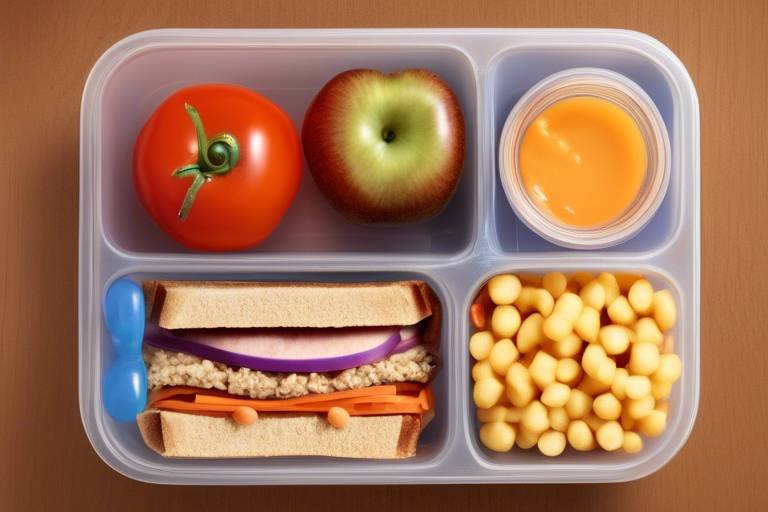The Benefits of Unprocessed Foods for Your Family
In today's fast-paced world, the convenience of processed foods often overshadows the incredible benefits of unprocessed foods. However, making the switch to a diet rich in whole, unprocessed ingredients can be a transformative choice for your family's health and well-being. Imagine a table filled with vibrant fruits, crisp vegetables, and wholesome grains—each bite bursting with flavor and nutrients. This article explores the numerous advantages of incorporating unprocessed foods into your family's diet, highlighting health benefits, cost-effectiveness, and practical tips for making the transition.
Unprocessed foods are often richer in essential nutrients, vitamins, and minerals compared to their processed counterparts. When you choose fresh fruits, vegetables, whole grains, and lean proteins, you're not just filling your plate; you're fueling your body with the essential building blocks it needs to thrive. For instance, consider the difference between a fresh apple and a sugary apple-flavored snack. The apple provides fiber, vitamin C, and antioxidants, while the processed version often comes packed with added sugars and preservatives. By prioritizing unprocessed foods, you can significantly enhance your family's overall health and well-being.
One of the joys of unprocessed foods is their natural taste. Have you ever bitten into a ripe tomato or savored the crunch of a freshly picked cucumber? These ingredients can elevate the flavor of your meals, making them more enjoyable for the whole family. When you cook with fresh, unprocessed ingredients, you're not just preparing food; you're creating an experience. The vibrant colors and rich flavors of unprocessed foods can transform even the simplest dishes into culinary masterpieces. Plus, cooking with your family can become a delightful adventure, exploring new flavors and textures together.
Eating unprocessed foods encourages seasonal eating, which promotes the consumption of locally grown produce. Seasonal eating not only supports your health by providing fruits and vegetables at their peak freshness, but it also connects you with the rhythms of nature. Think of it as a delicious way to celebrate the changing seasons. By incorporating seasonal ingredients into your meals, you're likely to discover new flavors and recipes that you may not have tried before. Not to mention, this practice benefits the environment by reducing the need for long-distance transportation of food.
Choosing unprocessed foods often means supporting local farmers and businesses. When you buy from local sources, you're investing in your community and helping to sustain local economies. This can create a ripple effect, strengthening community ties and fostering a sense of belonging. Plus, many local farmers use sustainable practices, which can lead to healthier soil and ecosystems. By choosing to support local agriculture, you’re not just feeding your family; you’re also contributing to a healthier planet.
By opting for local, unprocessed foods, families can lower their carbon footprint. Every time you choose to buy locally sourced produce, you’re reducing the environmental impact associated with transporting food over long distances. This is a simple yet powerful way to contribute to a more sustainable future. Imagine the difference it could make if every family chose to buy local—less pollution, fresher food, and stronger communities. It's a win-win situation for both your family and the planet!
Preparing unprocessed meals creates opportunities for family bonding. Cooking together can be a fun and engaging way to teach children about healthy eating habits while fostering teamwork and communication. Imagine gathering around the kitchen, chopping vegetables, and sharing stories as you create a meal together. This not only makes mealtime more enjoyable but also instills valuable skills and a sense of accomplishment in your children. Plus, when everyone has a hand in the cooking process, they are more likely to appreciate and enjoy the meals you create together.
While some may believe unprocessed foods are expensive, they can actually be more cost-effective in the long run. When you consider the health-related savings that come from eating nutritious foods—such as fewer doctor visits and lower medication costs—the value becomes clear. Additionally, unprocessed foods often require fewer ingredients than their processed counterparts, meaning you can create delicious meals without breaking the bank. Think of it this way: investing in your family's health today can lead to significant savings tomorrow.
Effective meal planning can help families save money while eating unprocessed foods. By planning your meals in advance, you can make smarter shopping choices and reduce food waste. Start by creating a weekly menu that incorporates seasonal ingredients, and then build your grocery list around that. This not only helps you stick to your budget but also ensures that you're always eating fresh, nutritious meals. Plus, having a plan can take the stress out of mealtime, allowing you to enjoy the cooking process even more.
Buying unprocessed foods in bulk can save money and reduce waste. Consider purchasing grains, legumes, and nuts in larger quantities, as this can often lead to significant savings. When it comes to storage, make sure to keep these foods in airtight containers to maintain freshness and minimize spoilage. You can also freeze seasonal fruits and vegetables to enjoy their flavors long after the harvest. With a little planning, you can stock your pantry with wholesome ingredients that will nourish your family for weeks to come.
- What are unprocessed foods? Unprocessed foods are whole foods that have not been altered or refined, such as fresh fruits, vegetables, whole grains, and lean proteins.
- How can I start incorporating unprocessed foods into my family's diet? Begin by gradually replacing processed foods with whole foods, planning meals around fresh ingredients, and exploring local farmers' markets.
- Are unprocessed foods more expensive? While some unprocessed foods may have a higher upfront cost, they can save money in the long run by promoting better health and reducing waste.
- Can I still enjoy convenience while eating unprocessed? Yes! You can prepare meals in advance, batch cook, and use simple recipes to maintain convenience without sacrificing nutrition.

Improved Nutritional Value
When it comes to food, the term "unprocessed" might sound a bit dull or unexciting, but let me tell you, it packs a serious punch when it comes to nutrition! Unprocessed foods are like nature's original recipes, bursting with essential nutrients, vitamins, and minerals that our bodies crave. Think about it: when you bite into a fresh apple, you're not just enjoying a snack; you're fueling your body with fiber, vitamin C, and a host of antioxidants that processed snacks simply can't compete with.
The beauty of unprocessed foods lies in their simplicity. These foods retain their natural state, meaning they haven't been stripped of their nutrients through manufacturing processes. For example, consider the difference between white rice and brown rice. Brown rice is a whole grain that contains the bran and germ, making it a powerhouse of nutrients like magnesium, phosphorus, and B vitamins. In contrast, white rice has been milled and polished, losing many of those beneficial components in the process.
A diet rich in unprocessed foods can lead to improved health outcomes. Research has shown that individuals who consume more whole foods tend to have lower risks of chronic diseases such as heart disease, diabetes, and obesity. This is largely due to the higher levels of nutrients and lower levels of added sugars, unhealthy fats, and preservatives found in unprocessed foods. When you prioritize these foods, you're not just making a choice for today; you're investing in your family's long-term health.
Moreover, unprocessed foods can help regulate your body's systems. For instance, the natural fiber found in fruits and vegetables aids in digestion and keeps your gut health in check. It's like giving your digestive system a gentle workout! Eating a variety of unprocessed foods ensures you get a wide range of nutrients that work together to support your immune system, boost energy levels, and enhance overall well-being.
So, how can you make sure you're incorporating these nutritional powerhouses into your family's diet? Start by filling your pantry and fridge with whole foods like:
- Fruits and vegetables
- Whole grains
- Nuts and seeds
- Legumes
- Lean meats and fish

Enhanced Flavor and Freshness
When it comes to food, nothing beats the vibrant flavors and freshness of unprocessed ingredients. Imagine biting into a juicy, sun-ripened tomato or savoring the crunch of a freshly picked carrot. These experiences are not just about taste; they are a celebration of nature's bounty. Unprocessed foods retain their natural flavor profiles, which means that every meal can be a delightful culinary adventure for your family.
Processed foods often come with added preservatives, artificial flavors, and sugars that mask the real taste of ingredients. In contrast, unprocessed foods shine in their simplicity. They allow the true essence of each ingredient to come through, creating a more authentic and satisfying eating experience. When you use fresh herbs, for instance, you can elevate a dish from mundane to magnificent with just a sprinkle. The difference is palpable, and your taste buds will thank you!
Moreover, incorporating unprocessed foods into your meals encourages creativity in the kitchen. You can experiment with various cooking methods to bring out the best flavors. Whether it's roasting vegetables to caramelize their natural sugars or grilling meats to enhance their juiciness, the possibilities are endless. Cooking becomes a joyous activity rather than a chore, and your family will love being involved in the process.
One of the best ways to enjoy enhanced flavor and freshness is by embracing seasonal eating. When you choose to eat foods that are in season, you not only get the best taste but also the highest nutritional value. Seasonal produce is typically harvested at its peak ripeness, which means it’s bursting with flavor and nutrients. For example, enjoy the sweetness of strawberries in the summer or the earthy richness of squash in the fall. This practice not only satisfies your palate but also aligns with nature's rhythm.
Furthermore, seasonal eating promotes the consumption of locally grown produce, which is often fresher than items shipped from distant locations. By visiting local farmers' markets or joining a community-supported agriculture (CSA) program, you can access a variety of fresh fruits and vegetables that are picked just hours before reaching your table. This not only enhances flavor but also supports your local economy.
Choosing unprocessed foods often means supporting local farmers and businesses. This choice has a ripple effect on your community. By purchasing from local sources, you help sustain the livelihoods of farmers who are dedicated to growing quality produce. In turn, this fosters a sense of community and connection to the food you consume. You can even get to know the stories behind your food, which adds an extra layer of appreciation to each meal.
By opting for local, unprocessed foods, families can significantly lower their carbon footprint. The environmental impact of transporting food over long distances is substantial. By reducing food miles and supporting sustainable practices, you contribute to a healthier planet. Imagine enjoying a meal made from ingredients that traveled only a few miles to reach your plate—it’s not just good for you; it’s good for the earth!
In conclusion, the enhanced flavor and freshness of unprocessed foods create a delightful dining experience that can transform your family's meals. By embracing seasonal eating and supporting local farmers, you not only enjoy better tasting food but also contribute positively to your community and the environment. So why not take the plunge? Your taste buds and your family will surely appreciate it!
- What are unprocessed foods? Unprocessed foods are those that have not been altered from their natural state. They include fresh fruits, vegetables, whole grains, nuts, and meats without added preservatives or artificial ingredients.
- How can I start incorporating unprocessed foods into my diet? Start by gradually replacing processed foods with fresh fruits and vegetables. Plan meals around seasonal produce and explore local farmers' markets for the freshest options.
- Are unprocessed foods more expensive? While some unprocessed foods may seem pricier upfront, they can be more cost-effective in the long run due to health benefits and reduced medical expenses.
- How can I ensure I’m buying fresh, unprocessed foods? Look for local sources, check for seasonal produce, and read labels carefully to avoid added ingredients. Joining a CSA can also ensure you receive fresh, unprocessed foods regularly.

Seasonal Eating
Embracing is like dancing to the rhythm of nature; it’s about syncing your meals with what’s fresh and abundant at any given time of the year. When you choose to eat foods that are in season, you're not just treating your taste buds to the best flavors, but you're also boosting your health and supporting your local community. Imagine biting into a juicy, sun-ripened tomato in the summer or savoring the warmth of a hearty pumpkin soup in the fall. These experiences are not just about taste; they’re about connecting with the earth and the cycles of growth that nourish us.
Seasonal eating encourages you to explore a variety of produce throughout the year. This means you’ll be trying new fruits and vegetables that you might not have considered before. For example, during the winter months, you might find yourself cooking with root vegetables like carrots, turnips, and beets, which are not only delicious but also packed with nutrients. In contrast, summer brings a bounty of colorful berries, leafy greens, and vibrant peppers that can transform your meals into a feast of flavors and colors.
Moreover, seasonal eating promotes the consumption of locally grown produce, which is often harvested at its peak ripeness. This not only means better taste but also higher nutritional value. Foods that are picked at their prime are rich in vitamins and minerals, giving your family the essential nutrients they need to thrive. When you choose local, you’re also reducing the time your food spends in transit, which can diminish its quality and nutritional content.
By incorporating seasonal foods into your diet, you’re also playing a part in protecting the environment. Local produce typically requires fewer resources to transport, which means you’re contributing to a reduction in carbon emissions. It’s a win-win situation: you get to enjoy delicious, fresh food while also being a responsible steward of the planet. And let’s not forget the joy of visiting local farmers' markets, where you can meet the people who grow your food and learn more about their farming practices.
So, how can you start embracing seasonal eating? Here are a few tips:
- Visit local farmers' markets regularly to see what’s in season.
- Join a community-supported agriculture (CSA) program to receive a box of seasonal produce each week.
- Keep a seasonal produce calendar handy to remind you of what fruits and vegetables are at their peak throughout the year.

Supporting Local Farmers
When you choose unprocessed foods, you're not just making a healthier choice for your family; you're also and the community around you. This connection to local agriculture can be incredibly rewarding. Imagine walking through a farmer's market, chatting with the person who grew your tomatoes, or picking up fresh herbs just harvested that morning. It's a relationship that fosters trust and transparency in what we eat. By purchasing from local farmers, you are directly contributing to the local economy, which in turn helps create jobs and maintain vibrant communities.
Moreover, supporting local farmers promotes sustainable practices. Many local farms use methods that are kinder to the environment, such as crop rotation and organic farming techniques. These practices not only yield healthier produce but also help preserve the land for future generations. By buying unprocessed foods from local sources, you are making a conscious decision to prioritize sustainability over convenience. It’s like casting a vote with your wallet, opting for a system that values quality and care over mass production.
In addition to economic and environmental benefits, there’s a unique joy in knowing where your food comes from. When you support local farmers, you often find yourself enjoying fresher, more flavorful produce. Unlike supermarket items that may have traveled thousands of miles, local foods are harvested at their peak ripeness, bursting with flavor and nutrients. This freshness can transform a simple meal into a culinary delight, making family dinners something to look forward to.
Here are some ways you can support local farmers:
- Visit farmers' markets regularly to buy seasonal produce.
- Join a community-supported agriculture (CSA) program.
- Attend local food festivals and events to discover new farmers.
- Share your experiences on social media to encourage others to shop local.
By actively choosing to support local farmers, you are investing in your community's health and future. It’s a small change that can lead to significant impacts, both for your family and the environment. So the next time you’re at the grocery store, consider how your choices can ripple out to support the hardworking farmers in your area. After all, every bite you take is a chance to make a difference!
1. Why is it important to support local farmers?
Supporting local farmers helps boost the local economy, promotes sustainable agriculture, and provides fresher, tastier produce for your family.
2. How can I find local farmers?
You can find local farmers by visiting farmers' markets, joining community-supported agriculture (CSA) programs, or searching online directories that list local farms.
3. Are unprocessed foods more expensive?
While some unprocessed foods may seem pricier, they can be more cost-effective in the long run due to health benefits and reduced medical expenses.
4. How can I incorporate more unprocessed foods into my diet?
Start by meal planning, shopping at local markets, and gradually replacing processed items with fresh, whole foods.

Reducing Carbon Footprint
When we think about our family’s diet, it’s easy to overlook the broader impact of our food choices on the environment. However, opting for unprocessed foods can significantly help in reducing our carbon footprint. Have you ever wondered how your food travels from the farm to your table? The truth is, many processed foods have traveled thousands of miles, contributing to greenhouse gas emissions through transportation and packaging. By choosing local, unprocessed foods, you not only support your health but also the health of our planet.
Consider this: when you buy locally sourced fruits and vegetables, you are cutting down on the distance your food has to travel. This means fewer trucks on the road, less fuel consumption, and ultimately, a smaller carbon footprint. It’s like taking a deep breath of fresh air—every little bit helps! In fact, studies show that food transportation can account for up to 11% of total greenhouse gas emissions in the food system. By reducing food miles, we can make a tangible difference.
Moreover, unprocessed foods often come with minimal packaging, which means less waste ending up in landfills. Have you ever noticed how much plastic wraps and containers come with processed foods? By choosing fresh produce and whole grains, you are not just feeding your family better; you are also contributing to a cleaner environment. It’s a win-win situation!
Let’s break it down a bit further. Here are some key benefits of reducing your carbon footprint through unprocessed foods:
- Lower Emissions: Local foods require less transportation, leading to lower greenhouse gas emissions.
- Less Waste: Unprocessed foods typically come with less packaging, reducing overall waste.
- Support for Sustainable Practices: Many local farms practice sustainable agriculture, which is better for the environment.
Incorporating unprocessed foods into your diet doesn’t just benefit your family’s health; it also plays a crucial role in safeguarding our planet for future generations. Imagine a world where families come together, cooking meals with fresh, local ingredients, all while knowing they are making a positive impact. It’s not just about eating; it’s about creating a sustainable lifestyle that nourishes both the body and the earth.
So the next time you're at the grocery store or farmer's market, think about the journey your food has taken. By choosing unprocessed, local options, you’re making a conscious choice to reduce your carbon footprint and promote a healthier planet. It’s like planting a seed for a greener future—one meal at a time.
- What are unprocessed foods? Unprocessed foods are those that have not been altered from their original state, such as fresh fruits, vegetables, whole grains, and meats without additives.
- How can I find local unprocessed foods? Look for farmers' markets, local co-ops, or community-supported agriculture (CSA) programs in your area.
- Are unprocessed foods more expensive? While some unprocessed foods may seem pricier, they can lead to long-term savings by improving health and reducing waste.

Cooking Together as a Family
Cooking together as a family is not just about preparing meals; it's about creating memories, building relationships, and instilling valuable life skills in your children. Imagine the aroma of fresh ingredients wafting through your home, laughter echoing in the kitchen, and the joy of sharing a meal that each family member contributed to. Cooking can be a delightful adventure, and when you involve everyone, it transforms into a bonding experience that strengthens family ties.
When you gather around the kitchen, you’re not only making dinner; you’re teaching your kids essential cooking skills that they’ll carry with them for a lifetime. From chopping vegetables to measuring ingredients, each task is a building block for their independence. Plus, it’s a fantastic opportunity to sneak in some education! You can talk about fractions when measuring, discuss nutrition while choosing ingredients, or even explore different cultures through their cuisines. It’s like a mini classroom, but way more fun!
Here are some compelling reasons why cooking together is beneficial:
- Teamwork: Each family member has a role to play, fostering a sense of teamwork. Whether it’s washing vegetables or stirring the pot, everyone contributes to the final dish.
- Communication: Cooking provides a relaxed environment to talk and share stories. It’s a great way to catch up on each other’s lives and strengthen communication skills.
- Creativity: Experimenting with different ingredients and recipes encourages creativity. You can challenge each other to come up with unique dishes, making cooking a fun and imaginative process.
Moreover, cooking together can lead to healthier eating habits. When children participate in the cooking process, they are more likely to try new foods and develop a taste for healthier options. You can even turn it into a game by having a “healthy ingredient challenge,” where everyone picks a fruit or vegetable they want to include in the meal. This not only makes the meal more nutritious but also instills a sense of ownership and pride in what they eat.
To make the most of your family cooking sessions, consider setting a regular “family cooking night.” This can be a weekly event where everyone looks forward to trying new recipes and sharing their culinary creations. You can even rotate who gets to choose the recipe each week, giving everyone a chance to share their favorites. Remember, it’s not about perfection; it’s about the experience and the joy of being together.
In conclusion, cooking together as a family is a recipe for success in more ways than one. It nurtures relationships, builds essential skills, and promotes healthier eating habits. So, roll up those sleeves, gather your loved ones, and start cooking up some unforgettable memories!
Q: What are some easy recipes to start cooking with my family?
A: Start with simple recipes like homemade pizzas, tacos, or stir-fry. These allow everyone to customize their dish and are generally quick to prepare.
Q: How can I encourage picky eaters to try new foods?
A: Involve them in the cooking process! Let them choose ingredients or help prepare the meal. When they have a hand in the creation, they’re more likely to try it.
Q: What if my kids are too young to help in the kitchen?
A: Even young kids can help! They can wash vegetables, mix ingredients, or set the table. The key is to find age-appropriate tasks that make them feel included.

Cost-Effectiveness
When it comes to feeding your family, the perception that unprocessed foods are more expensive can be a significant barrier to making the switch. However, this notion is often misleading. In reality, incorporating unprocessed foods into your diet can lead to substantial savings in the long run. Think about it: when you choose whole foods like fruits, vegetables, grains, and meats over their processed counterparts, you’re not just investing in better health; you’re also making a choice that can lighten your grocery bill over time.
One of the primary reasons why unprocessed foods can be more cost-effective is the reduced reliance on pre-packaged meals and snacks. These convenience items often come with a hefty price tag, not to mention a host of preservatives and additives. By preparing meals from scratch using fresh ingredients, families can save money while enjoying meals that are not only healthier but also tastier. So, how can you maximize your savings while enjoying the benefits of unprocessed foods? Let’s dive into a few strategies.
Effective meal planning is a game changer when it comes to eating unprocessed foods on a budget. By taking the time to plan your meals for the week, you can avoid impulse buys and reduce food waste. Here’s how you can get started:
- Assess Your Pantry: Before you make your grocery list, check what you already have. This will help you use up ingredients you might otherwise forget about.
- Create a Weekly Menu: Plan meals that incorporate similar ingredients to maximize your purchases. For example, if you buy a bunch of spinach, plan to use it in salads, omelets, and smoothies.
- Stick to Your List: When you go shopping, stick to your list to avoid unnecessary purchases. This simple step can keep your budget in check.
By following these steps, you can ensure that your meals are not only delicious but also economical. Plus, planning your meals ahead of time means less stress during the week, allowing you to enjoy cooking with your family.
Another effective way to save money while eating unprocessed foods is to buy in bulk. Many grocery stores and co-ops offer discounts on bulk purchases, which can significantly lower your overall grocery costs. Here are some tips for bulk buying:
- Choose Staples: Focus on buying staples like grains, beans, and nuts in bulk. These items have a long shelf life and can be used in a variety of meals.
- Store Properly: Proper storage is key to maintaining the freshness of bulk items. Use airtight containers to keep your grains and nuts from going stale.
- Share with Friends: Consider teaming up with friends or family to buy in bulk. This way, you can split the cost and avoid excess waste.
While it may require a bit of upfront investment, buying unprocessed foods in bulk can lead to significant savings over time. Imagine having a pantry stocked with wholesome ingredients, ready for you to whip up a nutritious meal at a moment's notice!
In conclusion, the idea that unprocessed foods are inherently more expensive is a misconception. By embracing meal planning, bulk buying, and proper storage techniques, you can enjoy the numerous benefits of unprocessed foods without breaking the bank. Not only will your family be healthier, but your wallet will thank you too!
1. Are unprocessed foods really cheaper than processed foods?
Yes, while the initial cost may seem higher, unprocessed foods can save you money in the long run through reduced health costs and less food waste.
2. How can I incorporate more unprocessed foods into my family's diet?
Start by planning your meals, shopping for seasonal produce, and gradually replacing processed items with whole foods.
3. What are some affordable unprocessed food options?
Staples such as rice, beans, oats, and seasonal fruits and vegetables are often very affordable and nutritious.
4. How can I make meal prep easier?
Consider dedicating one day a week to meal prep, where you can cook in batches and store meals for the week ahead.

Meal Planning and Preparation
When it comes to incorporating unprocessed foods into your family's diet, can be your best allies. Imagine walking into your kitchen, armed with a plan and a sense of excitement, ready to whip up delicious, nourishing meals that everyone will love. Sounds great, right? But how do you get there? The key lies in a little preparation and a dash of creativity.
First off, consider setting aside a specific time each week to plan your meals. This doesn't have to be a daunting task; think of it as a fun puzzle to solve! Gather your family around the table and brainstorm meal ideas together. Not only does this promote teamwork, but it also ensures that everyone is excited about the meals to come. You can create a simple chart, like the one below, to help visualize your weekly meals:
| Day | Breakfast | Lunch | Dinner |
|---|---|---|---|
| Monday | Oatmeal with fruits | Quinoa salad | Grilled chicken with veggies |
| Tuesday | Smoothie bowl | Vegetable wrap | Stir-fried tofu and broccoli |
| Wednesday | Eggs and avocado toast | Chickpea salad | Spaghetti with homemade sauce |
| Thursday | Yogurt with granola | Leftover stir-fry | Fish tacos with cabbage slaw |
| Friday | Pancakes with maple syrup | Caprese sandwich | Homemade pizza night |
Once you have a meal plan, it's time to prepare a shopping list. This is where you can really focus on unprocessed ingredients. Stick to the perimeter of the grocery store where fresh produce, meats, and dairy products are usually found. Avoid the aisles filled with processed foods that can derail your healthy eating goals. Pro tip: Don't forget to check your pantry and fridge before heading out to avoid buying duplicates!
After shopping, consider dedicating a couple of hours to meal prep. This can involve washing and chopping vegetables, marinating proteins, or even cooking grains in bulk. By doing this, you're setting yourself up for success during the week. When dinner time rolls around, half the work is already done! Plus, cooking together can be a bonding experience. You might find that your kids love to help out in the kitchen, making it a family affair.
Lastly, don't underestimate the power of leftovers. They can be your best friend when you’re busy or just not feeling like cooking. Plan to make larger portions of meals that can easily be reheated or transformed into something new. For instance, leftover grilled chicken can become a delicious chicken salad for lunch the next day. It’s all about flexibility and creativity!
In summary, meal planning and preparation not only save you time and money but also ensure that your family enjoys the wholesome goodness of unprocessed foods. So gather your family, get creative, and watch as you transform mealtime into a delightful experience!
- What are unprocessed foods? Unprocessed foods are items that are in their natural state or minimally altered, such as fruits, vegetables, whole grains, and meats without additives.
- How can I get my kids to eat unprocessed foods? Involve them in meal planning and preparation, and make the food visually appealing. Fun shapes and colors can entice even the pickiest eaters!
- Is meal planning difficult? Not at all! Start with simple meals and gradually expand your repertoire. It becomes easier with practice.

Bulk Buying and Storage Tips
When it comes to adopting a lifestyle centered around unprocessed foods, bulk buying can be a game changer. Not only does it save you money, but it also allows you to stock up on nutritious ingredients that can be used in a variety of meals. Imagine walking into your kitchen and seeing shelves filled with wholesome grains, beans, and nuts, all ready to be transformed into delicious dishes. However, bulk buying comes with its own set of challenges, particularly in terms of storage. So, how can you make the most of your bulk purchases while keeping everything fresh and tasty?
First off, investing in quality storage containers is essential. Airtight containers are your best friends when it comes to preserving the freshness of bulk items. Consider using glass jars, which not only look aesthetically pleasing but also help keep moisture and pests at bay. For larger quantities, food-grade buckets with airtight lids can be a practical solution. You can easily label these containers with the purchase date and contents, making it easy to keep track of what you have on hand.
Next, think about the temperature and humidity of your storage area. Most unprocessed foods thrive in cool, dry environments. A pantry or cupboard away from direct sunlight is ideal. If you’re storing grains or legumes, consider placing them in the refrigerator or freezer to extend their shelf life. Just imagine the satisfaction of knowing you have a stash of fresh quinoa ready for your next family meal, all because you took the time to store it properly!
Another tip is to plan your meals around your bulk purchases. This not only helps you utilize what you’ve bought but also reduces waste. For instance, if you buy a large bag of lentils, consider planning multiple meals that incorporate them, such as soups, salads, and even veggie burgers. This way, you’re not just saving money; you’re also ensuring that your family enjoys a variety of flavors and nutrients.
Lastly, don’t forget about sharing with friends and neighbors. If you find that you’ve purchased more than you can consume, why not split bulk items with others? This not only helps you save money but also fosters a sense of community. You can host a bulk-buying party where everyone brings their favorite items, and you can trade or share. It’s a win-win situation!
In summary, bulk buying is a fantastic way to embrace unprocessed foods while being economical. By investing in quality storage solutions, keeping an eye on the environment where you store your food, planning meals effectively, and sharing with others, you can make the most out of your bulk purchases. So, are you ready to dive into the world of bulk buying?
- What types of unprocessed foods can I buy in bulk?
Common bulk items include grains like rice and quinoa, legumes such as beans and lentils, nuts, seeds, and dried fruits. You can also find spices and natural sweeteners like honey in bulk. - How can I tell if bulk foods are still good to eat?
Always check for signs of spoilage, such as off smells, discoloration, or pests. If stored properly, most unprocessed foods can last for months or even years. - Are there any downsides to bulk buying?
While bulk buying can save money, it requires careful planning and storage. If you buy too much of something and can’t use it in time, it may go to waste.
Frequently Asked Questions
- What are unprocessed foods?
Unprocessed foods are natural foods that have not been altered or refined in any way. This includes fresh fruits, vegetables, whole grains, nuts, seeds, and unprocessed meats. They retain their original nutrients and flavors, making them a healthier choice for your family.
- How do unprocessed foods improve nutritional value?
Unprocessed foods are packed with essential vitamins, minerals, and antioxidants that are often lost during processing. By consuming these foods, you provide your family with the nutrients needed for better health, improved energy levels, and enhanced immune function.
- Can eating unprocessed foods be cost-effective?
Absolutely! While some unprocessed foods may seem pricier at first, they can save you money in the long run. By reducing health-related expenses and avoiding processed snacks and meals, you’ll find that your grocery bills can actually decrease.
- How can I get my family involved in cooking unprocessed meals?
Cooking together can be a fun family activity! Involve your family by assigning tasks like washing vegetables, measuring ingredients, or stirring pots. This not only fosters teamwork but also teaches valuable cooking skills and encourages healthier eating habits.
- What are some tips for meal planning with unprocessed foods?
Start by creating a weekly menu based on seasonal produce and what’s on sale. Make a shopping list to avoid impulse buys, and consider bulk buying staples like grains and legumes. This approach helps save money and ensures you have healthy meals ready to go.
- How can I store unprocessed foods to keep them fresh?
To maintain freshness, store fruits and vegetables in the refrigerator, and keep grains and nuts in airtight containers in a cool, dry place. For bulk items, consider using vacuum-sealed bags or jars to extend their shelf life and reduce waste.
- What are the environmental benefits of choosing unprocessed foods?
Opting for unprocessed foods, especially local produce, helps reduce your carbon footprint. By lowering food miles and supporting sustainable farming practices, you contribute to a healthier planet and promote biodiversity.



















